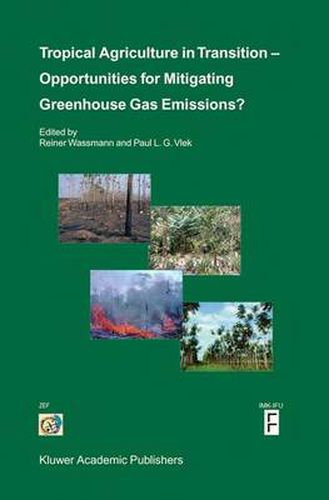Readings Newsletter
Become a Readings Member to make your shopping experience even easier.
Sign in or sign up for free!
You’re not far away from qualifying for FREE standard shipping within Australia
You’ve qualified for FREE standard shipping within Australia
The cart is loading…






This title is printed to order. This book may have been self-published. If so, we cannot guarantee the quality of the content. In the main most books will have gone through the editing process however some may not. We therefore suggest that you be aware of this before ordering this book. If in doubt check either the author or publisher’s details as we are unable to accept any returns unless they are faulty. Please contact us if you have any questions.
Production from tropical agricultural systems will need to increase to satisfy the rising food demand of an increasing population coupled with changes in consumption patterns. At the same time, the agricultural sector is a significant source of greenhouse gases (GHG) in many developing countries, which can be attributed mainly to land-use change and methane emissions from rice and livestock. But how can we reconcile less GHG emissions from tropical agricultural systems while increasing productivity?
Due to the interactive nature of these issues, this book is compiled of articles on natural resource management, as well as the socio-economic aspects of GHG mitigation. The scope of mitigation options in tropical agriculture is discussed for three different activities: (a) agroforestry; (b) rice-based production systems; © pasture/animal husbandry.
Agronomic solutions alone will not be sufficient, as the institutional and economic frameworks within which farmers operate dictate whether a recommended agronomic management practice is acceptable. The prevention of deforestation, and the re-forestation of degraded land, could become key elements to national climate protection programs of some developing countries. Alternative management practices in rice-based and pasture systems may offer win-win options to reduce emissions and improve resource-use efficiencies.
$9.00 standard shipping within Australia
FREE standard shipping within Australia for orders over $100.00
Express & International shipping calculated at checkout
This title is printed to order. This book may have been self-published. If so, we cannot guarantee the quality of the content. In the main most books will have gone through the editing process however some may not. We therefore suggest that you be aware of this before ordering this book. If in doubt check either the author or publisher’s details as we are unable to accept any returns unless they are faulty. Please contact us if you have any questions.
Production from tropical agricultural systems will need to increase to satisfy the rising food demand of an increasing population coupled with changes in consumption patterns. At the same time, the agricultural sector is a significant source of greenhouse gases (GHG) in many developing countries, which can be attributed mainly to land-use change and methane emissions from rice and livestock. But how can we reconcile less GHG emissions from tropical agricultural systems while increasing productivity?
Due to the interactive nature of these issues, this book is compiled of articles on natural resource management, as well as the socio-economic aspects of GHG mitigation. The scope of mitigation options in tropical agriculture is discussed for three different activities: (a) agroforestry; (b) rice-based production systems; © pasture/animal husbandry.
Agronomic solutions alone will not be sufficient, as the institutional and economic frameworks within which farmers operate dictate whether a recommended agronomic management practice is acceptable. The prevention of deforestation, and the re-forestation of degraded land, could become key elements to national climate protection programs of some developing countries. Alternative management practices in rice-based and pasture systems may offer win-win options to reduce emissions and improve resource-use efficiencies.